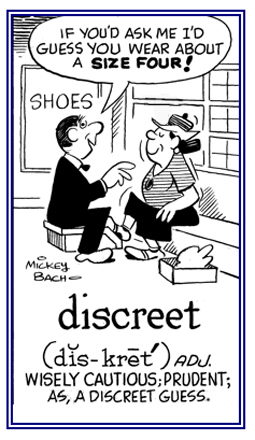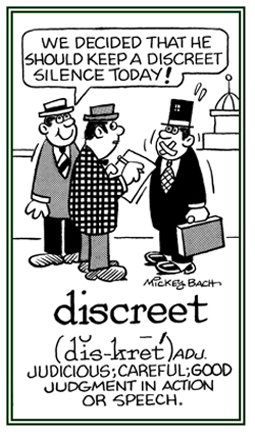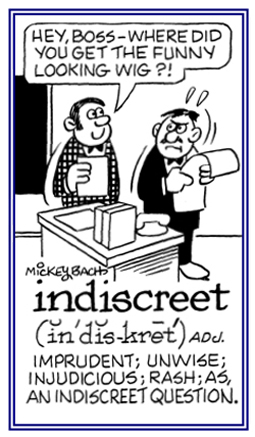cern-, cert-, cer-; cret-, creet-, cre-
(Latin: to separate, to sift, to distinguish, to understand, to decide, to determine; separated, separation, to set apart; the glandular extraction or the movement out of a natural substance)
Used to express the ability a person has to distinguish, or to perceive, something with the eyes and the mind. Related to crit-; as in criticize, diacritical, critique, etc.
Being disturbed, confused, and greatly embarrassed: Sam was experiencing disconcertedness when he realized that he was wearing two different shoes..
disconcerting (adjective), more disconcerting, most disconcerting
A reference to being upsetting, disturbing, and frustrating: Isaac found it disconcerting to have to wait so long before he could see the doctor.
The most disconcerting event during Patrick's trip to Great Britain was the delay in his flight for hours because of the terrible storm that was going on in the U.S.
discreet (dis KREET) (adjective), more discreet, most discreet
1. A reference to being careful to avoid embarrassing situations or upsetting another person: While waiting for a table at the elegant restaurant, Sally spoke to her mother in a very quiet and discreet tone of voice saying that her slip was hanging down below her dress.
2. Pertaining to not talking about anything that should be secret or confidential: The Jacksons invited their neighbors over for tea in the afternoon and they were very discreet and avoided asking about their daughter's recent divorce, knowing it was a painful subject.
3. Tactful and judicious; especially, in dealing with others; careful not to say or to do the wrong thing: Isaac made discreet inquiries about his daughter's bank account so she wouldn't spend more than is deposited in it.
4. Subtle and circumspect, ensuring that no undue attention distracts others: A photographer followed the bride and groom at a discreet distance so he wouldn't interfere with the wedding ceremony.
5. Etymology: from Latin, discernere, "to separate, to discern"; from dis-, "apart" + cerno, "pick".

© ALL rights are reserved.

© ALL rights are reserved.
Go to this Word A Day Revisited Index
2. Pertaining to not talking about anything that should be secret or confidential: The Jacksons invited their neighbors over for tea in the afternoon and they were very discreet and avoided asking about their daughter's recent divorce, knowing it was a painful subject.
3. Tactful and judicious; especially, in dealing with others; careful not to say or to do the wrong thing: Isaac made discreet inquiries about his daughter's bank account so she wouldn't spend more than is deposited in it.
4. Subtle and circumspect, ensuring that no undue attention distracts others: A photographer followed the bride and groom at a discreet distance so he wouldn't interfere with the wedding ceremony.
5. Etymology: from Latin, discernere, "to separate, to discern"; from dis-, "apart" + cerno, "pick".


Go to this Word A Day Revisited Index
so you can see more of Mickey Bach's cartoons.
discreetly (adverb), more discreetly, most discreetly
Relating to avoiding upsetting or embarrassing anyone and not to give away anything confidential: As a psychologist, Joe learned that to discreetly ask anyone for personal information involved respecting his or her privacy, to be diplomatic, and to keep such data a secret from others.
discreetness (noun) (no plural)
A condition that suggests that someone is being careful about not allowing something to be known or noticed by very many people: Conrad made inquiries about the new job with discreetness so his current employer would not know about it.
discrete (dis KREET) (adjective), more discrete, most discrete
Completely separated and unconnected; that is, disconnected from others; distinct or separate: Charity and compassion are considered to be two discrete qualities.
Most learning processes can be broken down into a series of discrete steps.
1. The good judgment and sensitivity needed to avoid embarrassing or upsetting others.
2. The freedom or authority to judge something or to make a decision about it.
3. Etymology: from Late Latin discretionem, "discernment, power to make distinctions"; from Latin discretionem, "separation, distinction"; from discre-, the stem of discernere, "to separate, to distinguish".
2. The freedom or authority to judge something or to make a decision about it.
3. Etymology: from Late Latin discretionem, "discernment, power to make distinctions"; from Latin discretionem, "separation, distinction"; from discre-, the stem of discernere, "to separate, to distinguish".
discretionary (adjective), more discretionary, most discretionary
1. Giving someone the freedom to make a decision according to individual circumstances: Shirley has enough discretionary income to pay for a nice vacation on the California coast this year.
2. Given according to the merits of an individual case, rather than being provided or awarded automatically.
3. Able to be used as desired without any stipulations; done or used when necessary.
2. Given according to the merits of an individual case, rather than being provided or awarded automatically.
3. Able to be used as desired without any stipulations; done or used when necessary.
Money that is left after paying for things that are essential; such as, food, clothing, housing, etc.
Waste material, particularly feces, discharged from the body of animals and people.
excrete (verb), excretes; excreted; excreting
1. To isolate and discharge waste matter generated during metabolism; such as, through urinating or defecating.
2. To eliminate waste matter from leaves and roots.
2. To eliminate waste matter from leaves and roots.
1. The act or process of discharging waste matter from the tissues or organs: The kidneys excrete toxins from the body.
2. Waste matter that has been discharged from an animal or even a plant; such as, the excretion of sweat (animals) or other kinds of moisture (plants).
3. Etymology: from French excrétion, from Latin excretionem and from excernere, "to discharge".
2. Waste matter that has been discharged from an animal or even a plant; such as, the excretion of sweat (animals) or other kinds of moisture (plants).
3. Etymology: from French excrétion, from Latin excretionem and from excernere, "to discharge".
excretory (adjective) (not comparable)
Referring to or relating to the process of passing waste from the body: There are excretory organs that perform excretory functions.
In a very clear and direct way: Jim's mother repeated to him in no uncertain terms to never say that curse word again!
indiscreet (adjective), more indiscreet, most indiscreet
1. Relating to not having or showing good judgment; being careless: Repeating a confidence to another person which came from someone is an indiscreet action.
2. A reference to someone who reveals things that should not be shared with anyone else: Dale was indiscreet about his personal relationships with his girl friend; in other words, he told people about things that he should have kept secret.

© ALL rights are reserved.
Go to this Word A Day Revisited Index
2. A reference to someone who reveals things that should not be shared with anyone else: Dale was indiscreet about his personal relationships with his girl friend; in other words, he told people about things that he should have kept secret.



